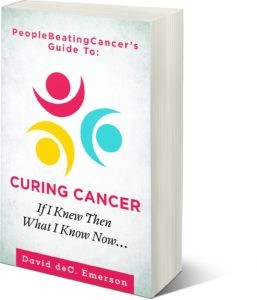
Diagnosed with Cancer? Your two greatest challenges are understanding cancer and understanding possible side effects from chemo and radiation. Knowledge is Power!
Learn about conventional, complementary, and integrative therapies.
Dealing with treatment side effects? Learn about evidence-based therapies to alleviate your symptoms.
Click the orange button to the right to learn more.
- You are here:
- Home »
- Blog »
- non-conventional therapies »
- Reduce Toxicity, Enhance Efficacy-Esophageal Cancer Therapy
Reduce Toxicity, Enhance Efficacy-Esophageal Cancer Therapy

Complementary, Integrative and Evidence-based Non-Conventional Esophageal Cancer Therapies will help you increase your overall survival-
Chemoradiotherapy, whether it is given to a cancer patient before (neoadjuvant) or after (adjuvant) surgery to remove a cancer tumor means one thing. Toxicity. Lots of toxicity. And toxicity means side-effects.
The studies linked below do say that chemoradiation before surgery to remove the Esophageal Cancer does improve one’s 5-year survival rate. However, stating that there were “no increased postoperative complications” with EC patients does not mean that these EC patients didn’t experience extreme toxicity. And therefore may experience long-term and late-stage side effects.
There are evidenced-based therapies that are proven to both ENHANCE the efficacy of conventional chemo and radiation while they REDUCE the risk of side effects (reduce toxicity) from conventional chemotherapy and radiation.
I am both a cancer survivor and cancer coach. Research and experience have taught me that esophageal cancer patients must look beyond conventional oncology to fully manage their cancer.
To learn more about integrative therapies to both enhance the efficacy of chemotherapy as well as reduce the toxicity of chemo, scroll down the page, post a question or a comment and I will reply to you ASAP.
Thank you,
David Emerson
- Cancer Survivor
- Cancer Coach
- Director PeopleBeatingCancer
Recommended Reading:
- Ask the Cancer Coach-“Stage 4 esophageal cancer diagnosis and treatment”
- Life after Esophageal Cancer Surgery aka Esophagectomy
- Esophageal cancer- Reduce Risk of Relapse with Cruciferous Veggies-
Effects of neoadjuvant radiochemotherapy on pathological staging and prognosis for locally advanced esophageal squamous cell carcinoma.
“The role of neoadjuvant therapy in the treatment of locally advanced EC still remains controversial…
- Stage I, the tumor limited to the esophageal lumen or the thickness of the esophageal wall varied between 3-5 mm;
- Stage II, the thickness exceeds 5 mm but no invasion of the mediastinum or distant metastasis;
- Stage III, the tumor invades adjacent mediastinal structure; and
- Stage IV, there is distant metastasis.
The tumor resection rate, pathological stage, treatment-related complication, and survival among groups were compared. The radical resection rate for the patients in radiotherapy and radiochemotherapy groups was increased in comparison with the control group..”
Meta-analysis of postoperative efficacy in patients receiving chemoradiotherapy followed by surgery for resectable esophageal carcinoma.
“BACKGROUND: Many studies have demonstrated that chemoradiotherapy followed by surgery (CRTS) prolongs the 5-year survival rate of resectable esophageal carcinoma patients. However, the effect of CRTS on postoperative complications, local recurrence and distant metastasis remains controversial. We performed a systematic review of the literature and conducted a meta-analysis to assess the postoperative efficacy of CRTS compared with surgery alone (SA).
CONCLUSIONS: CRTS significantly decreased postoperative mortality, local recurrence and distant metastasis rates compared to SA. Additionally, there were no increased postoperative complications for patients with resectable esophageal carcinoma.


